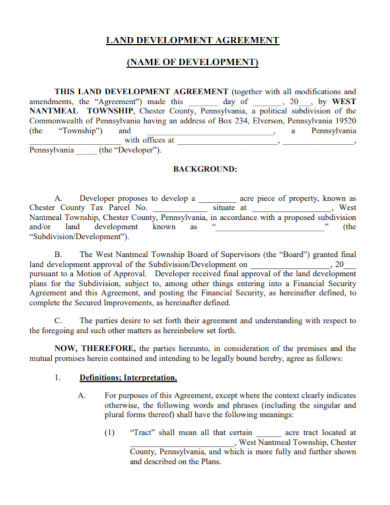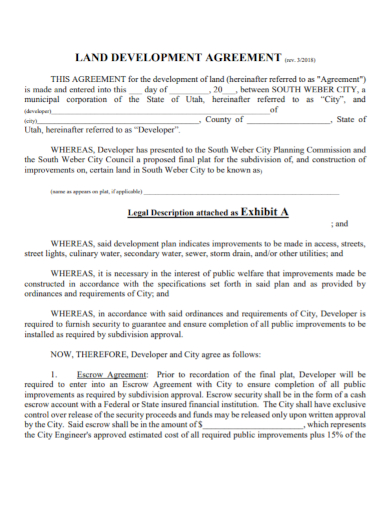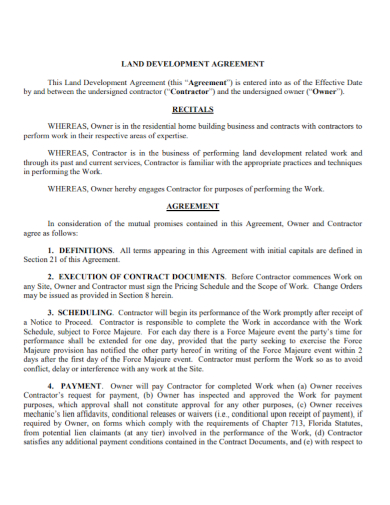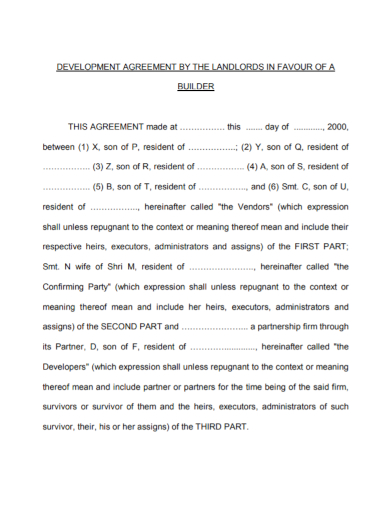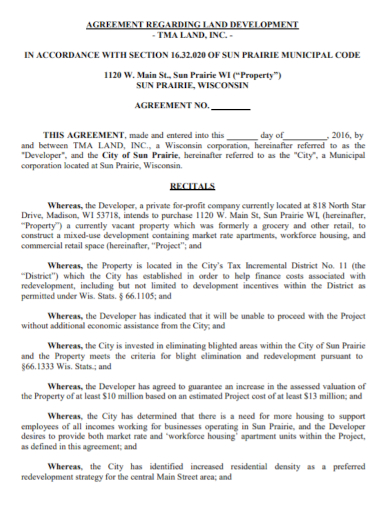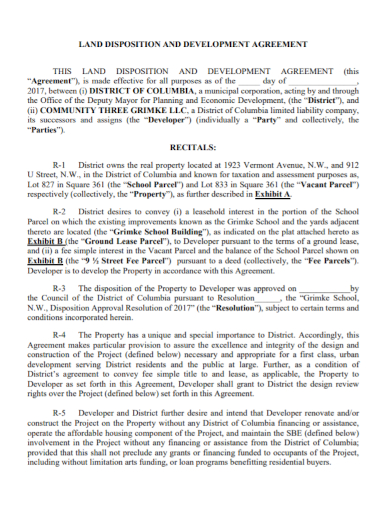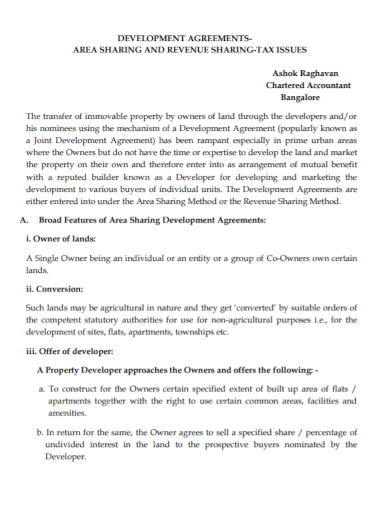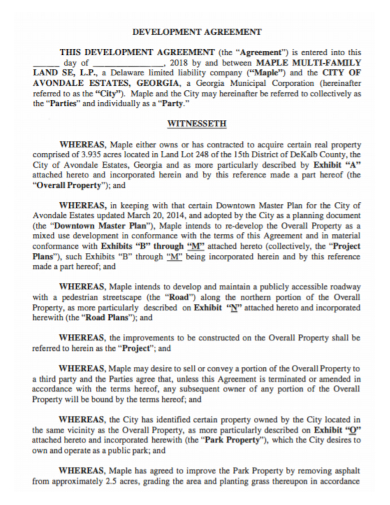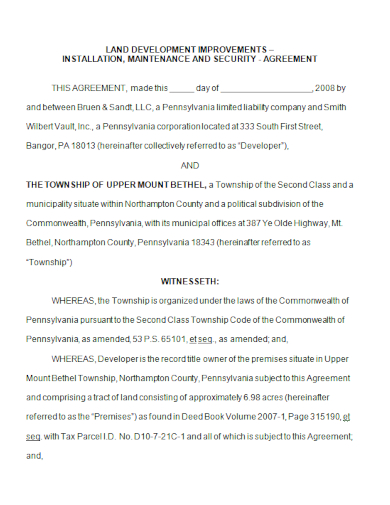10+ Land Development Agreement Samples
Land development is an increasing and booming industry in the business field right now. Aside from the fact that the land’s cost doesn’t depreciate as time goes, it also is a good investment that could be passed on from one generation to another. A land-development program is simply a description of the intended site uses. The programming phase often involves visiting the site, inspecting aerial photographs, performing market analyses or user-demand studies, and reviewing other available site and user information. Mostly in the booming part of the cities, land development is highly visible due to the increasing demands of business establishments and other office needs. With this, to cope up the challenging growth of the land corporate world, there must be a need for you to secure a Land Development Agreement form. To avoid doing this from scratch, our site offers you free, available and ready-made yet customizable templates that you can choose from. Just browse among these templates and choose the one that satisfies your needs the most.
For other agreement templates, our site is offering you these agreement templates that you can utilize when needed: Employee Equipment Agreement, Vendor Purchase Agreement, Vendor Merchandise Agreement, Vendor Service Agreement, Training Services Agreement, Teacher Agreement, Workshop Service Agreement, Student Teaching Agreement, Product Sales Agreement, Farm Land Lease Agreement, etc. This article will not only give you templates but also necessary information that you need to know for your agreement. So come on, explore this article with me!
1. Land Development Agreement
2. Sample Land Development Agreement
3. Contractor Land Development Agreement
4. Landlord Development Agreement
5. Agreement Regarding Land Development
6. Land Disposition Development Agreement
7. Real Estate Land Development Agreement
8. Master Development Land Purchase Agreement
9. Land Owner Development Agreement
10. Land Property Development Agreement
11. Land Development Security Agreement
What Is Land Development?
Land development is a complex process that involves the evaluation, planning, engineering, and construction of improvements on a piece of land based on codes and regulations set by the municipality and regulatory agencies.
How Do I Get Started With Land Development?
We are here to guide you through the entire process. While engineering and planning create a path, the guidance ultimately determines the success of your project. We work closely with you, real estate brokers, and developers to help match the right development to the right site.
What Are The Stages Of Land Development?
Becoming a property developer, or even dabbling in the idea of development is not as simple as it seems. Any project requires extensive legwork and preparation, well before the first shovel is in the ground. The majority of time is spent in the pre-development stage; working through market and feasibility studies, design and planning, approvals, documentation and financing. Less than 50% of a project’s duration is the visible on site construction period.
Developing any real estate project is a complex process which you can be brake down into 3 typical stages: pre-development, construction, and project completion. Below you will see a brief description of each stage and some of the steps within each stage.
Pre-Development Stage
After you have completed your market research, determined the demand for your project, and found a potential site. The next step is to come up with a concept plan. What can you currently build on the site? What can you potential build on the site? How many units? How big? What restrictions are there? In the early stages of a project, you mainly focus on due diligence, research, planning, and permitting. Investing at this stage carries the greatest and most varied risks; because there are many unknowns you must first assess, the local community plans, bylaws, development and planning policies. All of these documents are freely accessible on the municipal web site, or alternatively you can visit their offices and ask to see a hard copy in the planning department.
Construction
The middle stage involves construction and improvements. Since the pre-development tasks have been completed, the project risks at this stage are greatly reduced but certainly not eliminated. Finally you get on site and start building your project, although this stage can last anywhere between six and twelve months, depending on the size of the project, it’s the most exciting aspect of the development as you see all of your hard work coming to fruition.
Project Completion
The final stage of the development process is project completion, and in other words, this is the first stage of the building’s life. While the pre-development and construction risks may be removed by this point, selling the property, or obtaining tenants is still a risk. The occupancy permit generally marks the end of the construction phase and allows for the commencement of completion stage. As with the building permit, it is based upon objective criteria regarding construction quality and is a fairly administrative process.
FAQs
What are the main types of land use?
Here are five main different types of land use: residential, agricultural, recreation, transportation, and commercial.
What are examples of lands?
In economics, land comprises all naturally occurring resources as well as geographic land. Examples include particular geographical locations, mineral deposits, forests, fish stocks, atmospheric quality, geostationary orbits, and portions of the electromagnetic spectrum. Supply of these resources is fixed.
Is land a free good?
Any ‘gift of nature’, whether it be a good such as air, or a primary input such as labour or land (in the narrow sense), might be a free good under certain circumstances. But a produced commodity can be a free good, other than in the market period, only if it is a joint product.
Having this document might be a hard task for you especially if you are doing it from scratch so as it needs to consider a lot of legalities that should be in lined with the law. To avoid this, you are highly encouraged to avail resources that you can see online to make your work, easy, convenient and quality-made. So what are you waiting for? Avail our templates now!
Related Posts
FREE 26+ Investment Agreement Samples in PDF | MS Word | Google Docs | Pages
Agreement Between Two Parties For Money Samples & Templates
Land Purchase Agreement Samples & Templates
Sample Business Agreement between Two Parties
FREE 10+ Trial Agreement Samples In MS Word | Google Docs | Apple Pages | PDF
FREE 9+ Shop Rental Agreement Samples [ Commercial, Lease, Tenancy ]
FREE 10+ Charter Agreement Samples In MS Word | Google Docs | Apple Pages | PDF
FREE 10+ Mentoring Agreement Samples In MS Word | Apple Pages | PDF
FREE 10+ Partner Agreement Samples In MS Word | Google Docs | Apple Pages | PDF
FREE 10+ Individual Agreement Samples In MS Word | Google Docs | Apple Pages | PDF
FREE 10+ Strategic Agreement Samples In MS Word | Google Docs | Apple Pages | PDF
FREE 10+ Equity Agreement Samples In MS Word | Google Docs | Apple Pages | PDF
FREE 10+ Producer Agreement Samples in MS Word | Apple Pages | PDF
FREE 10+ Grant Agreement Samples In MS Word | Apple Pages | PDF
FREE 8+ Meeting Agreement Samples in MS Word | Google Docs | Apple Pages | PDF
